イベント&アクティビティ
“There is a great danger that the Olympics will become a superspreader event”
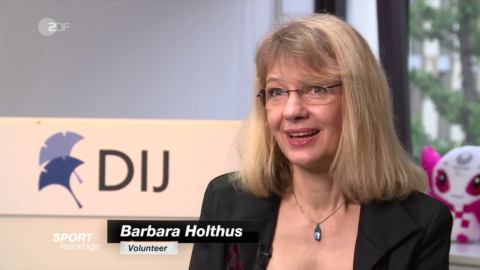
German TV ZDF visited the DIJ to interview deputy director Barbara Holthus about the increasing criticism of the Tokyo Olympics. “There is a danger of the Olympics becoming a superspreader event”, Barbara said. Her comments were broadcast in the ZDF Sport Reportage (23 May 2021) and can be viewed online. Barbara was also interviewed by German radio DLF about the potential cancellation of the Games. She said that she sees only a ten per cent chance for cancellation. “Monetary interests and the power of the IOC are too strong after all.” In addition, Barbara’s recent interview with German news agency SID on Olympic volunteers can now be viewed on the DIJ’s YouTube channel. For more information on research related to the Olympics, see the DIJ’s special project on the Tokyo Olympics and the open access book publication Japan Through the Lens of the Tokyo Olympics.
First lecture of DIJ Method Talks series: Sakura Yamamura on Mental Mapping
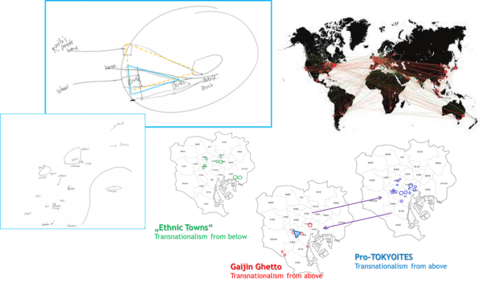
The diversification in and of urban spaces through rising mobility is inevitable, yet the actual capturing of socio-spatial urban transformation is still methodologically underexplored. Based on the analytical framework of Löw (2001), Sakura Yamamura employed the novel methodological tool of mental maps in her research on global and local mobility patterns. She combined it with 45 interviews with transnational migrant professionals in Tokyo, ethnographic site surveys and geographical mapping. The mental maps were drawn by transnational professional migrants in order to capture the extent and locations of urban transformations. In this presentation, she will introduce the method of mental mapping and discuss how it can be connected to spatial theory to capture socio-spatial transformations and mobility patterns in Tokyo and beyond. This lecture opens the new ‘DIJ Method Talks’ lecture series. Details and registration here
Speaker:
Sakura Yamamura, Max Planck Institute for the Study of Religious and Ethnic Diversity
DIJ expertise on Tokyo Olympics in international media
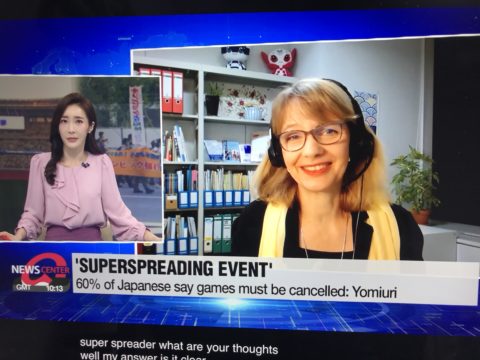
DIJ director Franz Waldenberger and deputy director Barbara Holthus have been quoted in several German and international media about recent developments regarding the Tokyo Olympics and their potential cancellation. In an interview with German radio DLF, Franz Waldenberger commented on the merits and demerits of a cancellation of the Games for Japanese companies. “If they have made advance payments, then they are now in a bad situation”, he explained. In a live interview with Korean TV Arirang’s News Center, Barbara Holthus argued that “the Games should not be held at this time, in the midst of a pandemic, at a time when really the whole world is suffering”. In the Daily Mail, she emphasized that holding the Games now was a “recipe for disaster” and that she was “very scared for the country and for the people of Japan”. For the German news agency SID and the news site Tagesschau, she explained the risks for Olympic volunteers and the general public. “There is a danger that the Games will become a superspreader event”, she commented. For more information on research related to the Olympics, see the DIJ’s special project on the Tokyo Olympics and the open access book publication Japan Through the Lens of the Tokyo Olympics.
DIJ Study Group on Post-Fukushima Literature
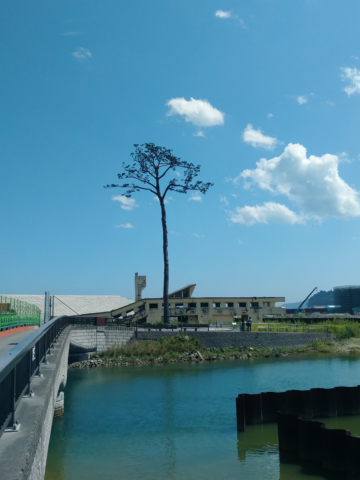
This talk will explore the political stakes of modes of seeing and remembering through the lenses of proximity and transparency, while proposing a possible reevaluation of these concepts in the light of the Fukushima Daiichi nuclear disaster. Radiation upsets spatial hierarchies and visual regimes by posing its own questions on positionality and representation. A tentative answer to such queries might come from a careful consideration of recent directions in scholarship in new materialism and ecocriticism, and in the form of a kind of ‘radioactive aesthetic’. Thanks to its poetics of avisuality and distance, radioactive aesthetic often attracts into its orbit literary works apparently removed from the catastrophe, thus proposing a corrective to the criteria of authority and proximity implicit in the process of canonization of works of ‘post-Fukushima literature’ and of disaster literature in general. Details and registration here
Speaker:
Chiara Pavone, University of California, Los Angeles
DIJ Study Group ‘Visions and Expectations of Autonomous Driving’
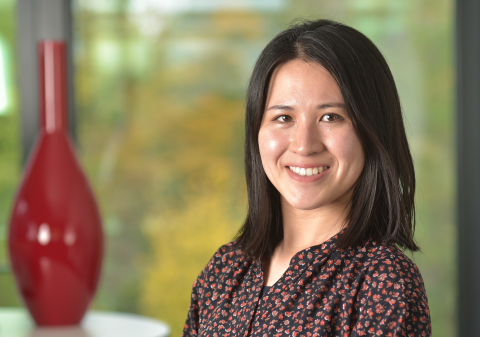 There are many innovation efforts in the field of mobility such as autonomous driving or ‘mobility as a service’ in Japan today. Expectations and visions play a significant role for the direction of innovations: future-oriented narratives and imaginaries mobilize interests and financial resources, stimulate agenda setting, and facilitate actor coordination. In the process of being shared by different actors, expectations can transform into binding requirements, or into self-evident assumptions providing orientation for future actions. This presentation explores the substance of governmental visions and expectations of autonomous driving in Japan by examining government policy documents and archival records. These visions include the performance of envisioned technologies that have yet to be realized and wider socio-technical transitions. However, such visions also entail the risk of policy makers becoming locked in a single pattern while overlooking alternative solutions. Details and registration here
There are many innovation efforts in the field of mobility such as autonomous driving or ‘mobility as a service’ in Japan today. Expectations and visions play a significant role for the direction of innovations: future-oriented narratives and imaginaries mobilize interests and financial resources, stimulate agenda setting, and facilitate actor coordination. In the process of being shared by different actors, expectations can transform into binding requirements, or into self-evident assumptions providing orientation for future actions. This presentation explores the substance of governmental visions and expectations of autonomous driving in Japan by examining government policy documents and archival records. These visions include the performance of envisioned technologies that have yet to be realized and wider socio-technical transitions. However, such visions also entail the risk of policy makers becoming locked in a single pattern while overlooking alternative solutions. Details and registration here
Speaker:
Yukari Yamasaki, Karlsruhe Institute of Technology
Barbara Holthus quoted in New York Times and Mainichi Shinbun
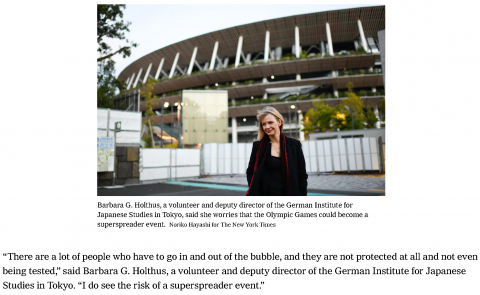
“I do see the risk of a superspreader event,” says Olympic volunteer and DIJ deputy director Barbara Holthus in an interview with the New York Times. In the article How Can the Olympics Protect 78,000 Volunteers From the Coronavirus? (May 2), she explains that Olympic volunteers are told to disinfect their hands, keep distance to visitors, and wear a mask. But they are also asked to address visitors with smiles and hospitality. “I find that very insensitive”, she comments. Barbara is also quoted in the Japanese daily Mainichi Shinbun (April 30), where she comments on the risks of holding the Games during the pandemic, and she is featured in the Mainichi‘s series “What to do with the Olympics” (May 14). For more information on research related to the Olympics, see the DIJ’s special project on the Tokyo Olympics and the open access book publication Japan Through the Lens of the Tokyo Olympics.
Barbara Holthus interviewed about Olympic volunteers
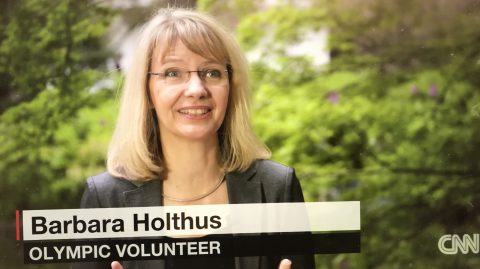
Three months before the scheduled opening of the Tokyo Olympics, DIJ deputy director Barbara Holthus was interviewed by Japanese and international media about Olympic volunteers. In Fuji TV’s news show ‘Viking More’, Barbara explained that volunteers are provided only with insufficient measures to protect against a Covid infection. There are also neither PCR testing nor vaccinations planned for volunteers. In the Japanese daily Mainichi Shinbun, she commented that the Games should not be held in the midst of the pandemic as they would neither have the expected economic impact nor create a positive legacy. Barbara also appeared on a CNN TV programme which was broadcast 100 days before the scheduled opening of the Games on April 14. What was meant to be a “once-in-a-lifetime” opportunity has now turned into “a really dangerous experience,” she said. The video can be viewed here. For more information on research related to the Olympics, see the DIJ’s special project on the Tokyo Olympics and the open access book publication Japan Through the Lens of the Tokyo Olympics.
Spring issue of DIJ Newsletter published
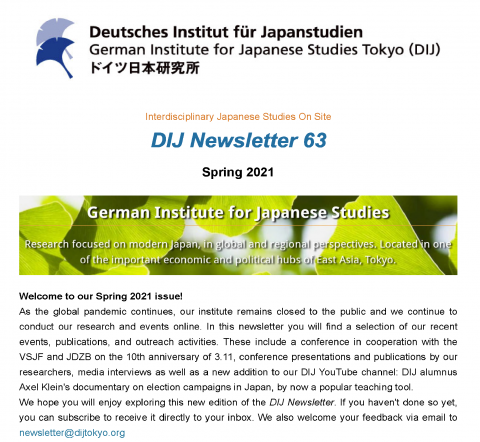
We have just published the spring issue of our DIJ Newsletter featuring updates on our research, publications, and outreach activities. In this issue you will find a selection of our recent and forthcoming activities, including a conference in cooperation with the German Association for Social Science Research on Japan (VSJF) and the Japanese-German Center Berlin (JDZB) on the 10th anniversary of 3.11; conference presentations and publications by our researchers; media interviews as well as a new addition to our DIJ YouTube channel: DIJ alumnus Axel Klein’s documentary on election campaigns in Japan, by now a popular teaching tool. We hope you will enjoy exploring this new edition of the DIJ Newsletter. If you haven’t done so yet, you can subscribe to receive it directly to your inbox. The full issue and subscription form are available here.








 Open Access
Open Access
